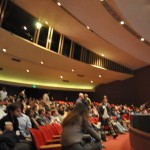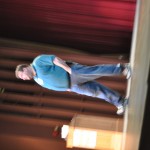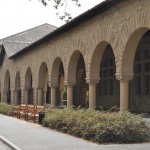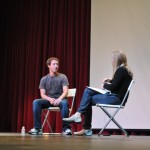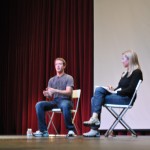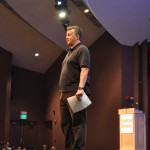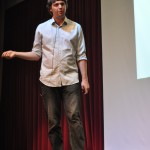A Few Notes From Startup School 2010
Earlier this month I traveled to San Francisco/Silicon Valley for an extended weekend because Y-Combinator accepted my application to attend Startup School hosted at Stanford. This was my first time visiting the region in several years and I was eager to make the most of my rare 36 hours in the Bay Area. I am incredibly thankful of Y-Combinator for sponsoring the event, and my parents for supporting my visit. My Mom used her frugal shopping skills to reserve a 50% discounted room at the San Mateo Marriott via Priceline.com, and my Dad used his sharp navigating skills to drive me to each location on time. Just to give you an idea of the significance of this event, take a look at the press coverage on the one day event: TechCrunch, GigaOM, Mashable, Yahoo, VentureBeat.
Startup School 2010 began with a continental breakfast outside of the Dinkelspiel Auditorium for all attendees and each of the nearly 750 attendees filed in for about an hour until 9:30AM. I think entrepreneurs are drawn to Startup School because it is an engaging event where each of the speakers is highly accomplished in the internet/technology field, and they all offered the personal success story behind their well known work. Not to mention, the attendees themselves are already well on their way to creating the next powerful companies that disrupt entire industries. (More on this point later with Brian Chesky.) My most conclusive observation by the end of the day was that each of the speakers has their own personal success story, but there is nothing close to a specific formula that will guarantee a high degree of personal and financial sanctification. Similarly, numerous ideas presented by the various speakers often conflicted with each other and I learned that even if you choose one certain course of action, there will always be challenges to overcome.
Andy Bechtolsheim was the first speaker of the day, and he offered a fitting speech about how he started his company Sun Microsystems and why he invested in Google before anyone else. Next Paul Graham took the stage and he presented his thoughts on the current state of the venture capital industry, which can be found on his personal website. Then the first website founder, Andrew Mason, offered his story about how he failed first and succeeded in his second idea, Groupon. After a short morning break, Tom Preston-Werner spoke passionately about his personal company philosophy at GitHub of optimizing for happiness and making choices that make us happy. Greg McAdoo, parter at Sequoia Capital, spoke next about how investors choose their portfolio companies, noting that authenticity is imperative. The last speaker of the morning, Reid Hoffman, founder of LinkedIn, presented the first clashing thoughts of the day and advised startups to pivot their direction when necessary.
During the lunch break all of the attendees congregated outside of the auditorium to eat pizza, and the majority of the attendees were very friendly to share their own experiences with internet business. To begin the afternoon session, Ron Conway, parter at SV Angel, spoke about his experiences in his most successful investments: Google, Facebook, and Twitter. Then ex-Facebook executive and now founder of Quora, Adam D’Angelo, presented his thoughts on how to gain the most possible advantages as a founder of a startup. Perhaps the most straightforward presentation of the day came from the failed founder, Dalton caldwell, who saw his life work Imeem crash and burn last year due to intellectual property laws. As tension slowly built up in the auditorium, the most anticipated speaker of the day appeared from backstage, Mark Zuckerberg, founder of Facebook. Zuckerberg did an interview style presentation and he discussed the culture at Facebook and debunked several misrepresentations in the recent hit movie, The Social Network. For the last speaker of the day, Y-Combinator invited their rising star Brian Chesky, founder of Airbnb, to speak about the short but uncommon story of his company. Chesky’s company, Airbnb, is a company that failed to gain critical mass on three launches but eventually made improvements on their idea through Y-Combinator and has disrupted the travel accommodations industry for the long run. To finish off the busy day, Airbnb sponsored a reception in downtown San Francisco later that night.
Startup School is a rare opportunity to collaborate with this dynamic group of people eager to make a difference in the world, and learning about the fundamental values shared by some of the fastest growing companies in the world is a priceless experience. I look forward to taking these timeless ideas and implementing them in my own startup one day.
Here are the informal notes and ideas that I jotted down throughout the day:
- Google is extraordinarily profitable because relevant search is incredibly important, and relevant ads are effective.
- #1 industry attracting venture capital investments is biotechnology.
- Apple spends the least % of revenue on R&D among tech giants, because Apple has the least number of products.
- Value your external input. Discover, design, deliver.
- The horizon effect: humans generally don’t pursue goals beyond the horizon.
- Understanding how what your doing makes a difference is critical.
- VC’s measure performance in rate of return per year.
- The only thing that can kill a good startup is itself.
- Advantages of the web are instant coordination and group collaboration.
- The tipping point: when the other option becomes the better option.
- You’ll probably fail.
- Your product needs some sort of virility.
- User experience is relevant, tech specs are not.
- Optimize for happiness.
- Read the books on this reading list by Tom Preston-Werner.
- You want to have as many choices as possible, and you want to be happy with those choices.
- Don’t throw $ at problems, throw ideas.
- VC’s are company builders.
- Authenticity is people caring about the idea they are solving.
- Users use what they encounter.
- Entrepreneurs must test early, pivot when necessary.
- See how fast other people are going to figure how fast you should be going.
- It takes guts, but anyone can do it.
- Join a startup for learning experience, then start your own company.



